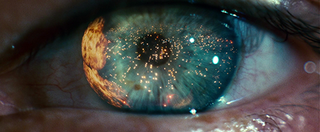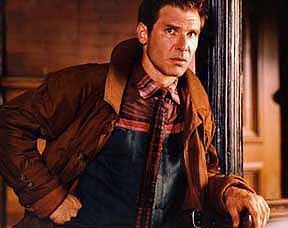
Blade Runner is a 1982 science fiction film directed by Ridley Scott, and written by Hampton Fancher and David Peoples. Starring Harrison Ford, Rutger Hauer, Sean Young, and Edward James Olmos, it is an adaptation of Philip K. Dick's 1968 novel Do Androids Dream of Electric Sheep? The film is set in a dystopian future Los Angeles of 2019, in which synthetic humans known as replicants are bio-engineered by the powerful Tyrell Corporation to work on space colonies. When a fugitive group of advanced replicants led by Roy Batty (Hauer) escapes back to Earth, burnt-out cop Rick Deckard (Ford) reluctantly agrees to hunt them down.

Blade Runner 2: The Edge of Human (1995) is a science fiction novel by American writer K. W. Jeter. It is a continuation of both the film Blade Runner and the novel upon which the film was based, Philip K. Dick's Do Androids Dream of Electric Sheep?

Kevin Wayne Jeter is an American science fiction and horror author known for his literary writing style, dark themes, and paranoid, unsympathetic characters. He has written novels set in the Star Trek and Star Wars universes, and has written three sequels to Blade Runner. Jeter coined the term "steampunks".

Philip Kindred Dick, often referred to by his initials PKD, was an American science fiction writer. He wrote 44 novels and about 121 short stories, most of which appeared in science fiction magazines during his lifetime. His fiction explored varied philosophical and social questions such as the nature of reality, perception, human nature, and identity, and commonly featured characters struggling against elements such as alternate realities, illusory environments, monopolistic corporations, drug abuse, authoritarian governments, and altered states of consciousness. He is considered one of the most important figures in 20th century science fiction.

Do Androids Dream of Electric Sheep? is a 1968 dystopian science fiction novel by American writer Philip K. Dick. It is set in a post-apocalyptic San Francisco, where Earth's life has been greatly damaged by a nuclear global war, leaving most animal species endangered or extinct. The main plot follows Rick Deckard, a bounty hunter who has to "retire" six escaped Nexus-6 model androids, while a secondary plot follows John Isidore, a man of sub-par IQ who aids the fugitive androids.
A replicant is a fictional bioengineered humanoid featured in the 1982 film Blade Runner and the 2017 sequel Blade Runner 2049 which is physically indistinguishable from an adult human and often possesses superhuman strength and intelligence. A replicant can be detected by means of the fictional Voight-Kampff test in which emotional responses are provoked; a replicant's nonverbal responses differ from those of a human. Failing the test leads to execution, which is euphemistically referred to as "retiring."

Blade Runner is a point-and-click adventure game developed by Westwood Studios and published by Virgin Interactive for Microsoft Windows, released in November 1997. The game is not a direct adaptation of the 1982 Ridley Scott film Blade Runner but is instead a "sidequel", telling an original story, which runs parallel to the film's plot, occasionally intersecting with it.

Total Recall 2070 is a science fiction television series influenced by the work of Philip K. Dick. It was first broadcast in 1999 on the Canadian television channel CHCH-TV and later the same year on the American Showtime channel. It was later syndicated in the United States with some editing to remove scenes of nudity, violence and strong language.

Hampton Lansden Fancher is an American actor, screenwriter, and filmmaker, who co-wrote the 1982 neo-noir science fiction film Blade Runner and its 2017 sequel Blade Runner 2049, based on the novel Do Androids Dream of Electric Sheep? by Philip K. Dick. His 1999 directorial debut, The Minus Man, won the Special Grand Prize of the Jury at the Montreal World Film Festival.

Despite the initial appearance of an action film, Blade Runner operates on an unusually rich number of dramatic levels. As with much of the cyberpunk genre, it owes a large debt to film noir, containing and exploring such conventions as the femme fatale, a Chandleresque first-person narration in the Theatrical Version, the questionable moral outlook of the hero—extended here to include even the literal humanity of the hero, as well as the usual dark and shadowy cinematography.

"Tears in rain" is a 42-word monologue, consisting of the last words of character Roy Batty in the 1982 Ridley Scott film Blade Runner. Written by David Peoples and altered by Hauer, the monologue is frequently quoted. Critic Mark Rowlands described it as "perhaps the most moving death soliloquy in cinematic history", and it is commonly viewed as the defining moment of Hauer's acting career.

Rick Deckard is a fictional character and the protagonist of Philip K. Dick's 1968 novel Do Androids Dream of Electric Sheep?. Harrison Ford portrayed the character in the 1982 film adaptation, Blade Runner, and reprised his role in the 2017 sequel, Blade Runner 2049. James Purefoy voiced the character in the 2014 BBC Radio 4 adaptation.

"More Human than Human" is a song by the American heavy metal band White Zombie from their album Astro-Creep: 2000 (1995). It was released as the first official single from the album and is also included on Rob Zombie's Past, Present & Future, the greatest hits album The Best of Rob Zombie, and a remix is included on Supersexy Swingin' Sounds and Revolutions.

The Bladerunner is a 1974 science fiction novel by Alan E. Nourse, about underground medical services and smuggling. It was the source for the title, but no major plot elements, of the 1982 film Blade Runner, adapted from the novel Do Androids Dream of Electric Sheep? by Philip K. Dick, though elements of the Nourse novel recur in a pair of 2002 films also largely adapted from Dick's work, Impostor and Minority Report.
Blade Runner is a 1982 science fiction film directed by Ridley Scott.

Blade Runner 2049 is a 2017 American epic neo-noir science fiction film directed by Denis Villeneuve from a screenplay by Hampton Fancher and Michael Green, based on a story by Fancher. A sequel to Blade Runner (1982), the film stars Ryan Gosling and Harrison Ford, with Ana de Armas, Sylvia Hoeks, Robin Wright, Mackenzie Davis, Dave Bautista, and Jared Leto in supporting roles. Ford and Edward James Olmos reprise their roles from the previous film as Rick Deckard and Gaff, respectively. Gosling plays K, a "blade runner" who uncovers a secret that threatens to destabilize society and the course of civilization.

Dust to Dust or Do Androids Dream of Electric Sheep?: Dust to Dust is an 8 issue comic book limited series published by BOOM! Studios in 2010. The series is a prequel to the story of Do Androids Dream of Electric Sheep? The series was written by Chris Roberson and drawn by Robert Adler.
Blade Runner is an American science fiction media franchise originating from the 1968 novel Do Androids Dream of Electric Sheep? by Philip K. Dick, about the character of Rick Deckard. The book has been adapted into several media, including films, comics, a stage play, and a radio serial. The first film adaptation was Blade Runner, directed by Ridley Scott in 1982. Although the film initially underperformed at the American box office, it became a cult classic, and has had a significant influence on science fiction. A novelization and a comic adaptation of the film were released in the same year. From 1995 to 2000, three novels serving as sequels to both Blade Runner and the original novel were written by K. W. Jeter, a friend of Dick's. A film sequel to Blade Runner, Blade Runner 2049, was released in 2017. To celebrate the 30th anniversary of Blade Runner in 2012, a short film was released, and in the lead up to the release of Blade Runner 2049, several more short films detailing events that occurred between 2019 and 2049 were released. The influence of the franchise has helped spawn the cyberpunk genre.
Postmodern Metanarratives: Blade Runner and Literature in the Age of Image is a non-fiction book by Décio Torres Cruz published in 2014 by Palgrave Macmillan.















